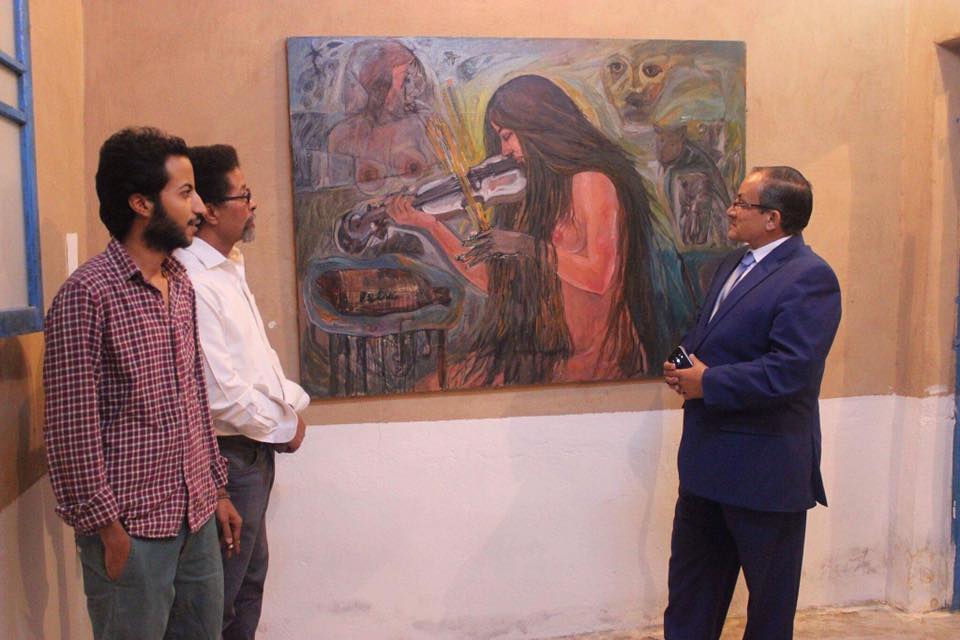Twenty-six caricaturists came together last week to give a satirical visual narrative of 2009. Recurring themes included the war on Gaza and subsequent political turmoil, US foreign policy in the Middle East, and socio-economic, cultural and political conditions in Egypt. Children’s rights also came up among the artists as an issue this year. The exhibition, which is being held at Sawy Culture Wheel, is called Hassad Al Caricature 2009, or The Harvest.
Caricature, the art of exaggerating physical features to produce a comic effect, has its origins in Pharaonic Egypt. It first appeared on the walls of some Egyptian temples and in satirical papyri. For almost two millenia, caricature’s popularity in Egypt declined, only to rebound in the Twentieth Century as a popular and inclusive art form. It has since been gaining popularity, with curated exhibitions at art galleries and cultural spaces, and the opening of the first caricature museum in Egypt in March 2009.
The caricatures exhibited in Hassad Al Caricature were varied in their styles and messages. The work of Ahmed Toghan, one of the founders of contemporary Egyptian caricature, was engaging as usual. His unique painterly style immediately catches the eye. The images are animated and lively, giving a sense of motion. The captions are also clever, exhibiting Toghan’s distinct sense of humor. Much of his work was a critique of socio-economic conditions in the country with reference to the corruption of civil servants and state institutions.
Mostafa Hussein, another prominent Egyptian caricaturist, also contributed to the show with a number of witty and original works. His drawings are detailed and bright, and the statements inevitably put a smile on the viewer’s face. Amr Fahmy, who shares a similar style, criticized the government using creative metaphors. The work of Sherif Arafa was more visually than conceptually interesting. Arafa used a comparative approach that was relatively unique among participating caricaturists.
Another interesting element in the show was the incorporation of collage in some of the caricatures, particularly those of Amr Selim. One piece, titled Recent Pictures of Arab Rulers, is a collage of drawings and photographs of different chairs, ranging from stools and office chairs to the ornate designs common in the reception areas of Egyptian homes. The piece is layered with political meaning, such as political systems striving to maintain their authority or the passivity of the systems in tackling their countries problems’ on both local and international levels. The variation in the chair styles also sheds light on the status of countries vis-a-vis one another, based on wealth and the resulting power struggle. The piece evokes much meaning without any text aside from the title. Recent Pictures of Arab Rulers is a perfect example of a successful caricature.
Doaa El Adl and Nermine Bahaa, the two preeminent female caricaturists in Egypt, participated in the show with a number of interesting works. Women received greater representation in their work, and are presented as family members and workers, without objectification. El Adl’s caricatures are, as usual, brilliant and stand out in the black and white caricatures section. Bahaa developed a series called Adventures of Handouka, a storyboard style caricature based on the fictitious character, Handouka. The drawings and storyline are entertaining in their sheer simplicity and they remind viewers of Arabic comic strips they used to read while growing up.
Hassad Al Caricature 2009 exemplifies the increasing exposure of caricatures as an art form. Caricatures have the advantages of escaping much censorship whether in printed magazines and newspapers or art spaces. They also have a mass appeal due to their satirical nature and their lasting visual effect in memory. With declining censorship in the Egyptian press, caricatures are expected to thrive as an art form and mobilization tool.
El Sawy Culture Wheel
Open till Monday January 11
River Hall
El Sawy Culturewheel
Address: 26th of July St. Zamalek, Cairo-Egypt
Phone number: 27368881




